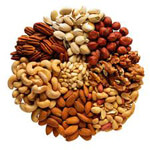
Iodine is an essential trace nutrient that is responsible for producing thyroid hormones. These hormones are responsible for regulating the metabolism, which affects the speed with which our bodies use energy, the regulation of body temperatures, cholesterol, and heart rates, mental and physical growth, and more. Without an adequate intake of iodine, our metabolism would become sluggish, resulting in a plethora of serious medical conditions – including an inability to lose weight. Sadly, iodine deficiencies…










